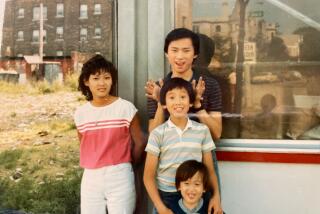‘Ann Landers’ of China Keeps Writing in U.S.
- Share via
“Qiu Ming Big Sister,” the letter from a young woman began. “I’m a farm girl. Although I’m of marrying age, I don’t want to get married. I don’t love him. We have nothing in common. I want to call the wedding off, but my parents will not permit that.”
This letter from a woman in China’s Jiangsu province is typical of the 600 or so missives received each year by Qiu Ming, the “Ann Landers” of China. Qiu, a journalist from Beijing who is living in Alhambra during a six-month visit to the United States, has not forsaken her readers while she is out of her home country.
Like clockwork, her weekly advice column continues to appear every Friday in the China Woman’s Daily, offering words of comfort that Qiu mails from Alhambra. About every two weeks, her editors forward another packet of selected letters to Qiu.
Emotional Outlet
Her advice, which reaches 300,000 subscribers in China, is often the only emotional outlet for some of her correspondents, Qiu said. The letter writers seek advice about everything from extramarital affairs to loneliness. One 9-year-old wrote asking what death is. A 74-year-old woman planning to marry a man 42 years her junior wanted to know how to deal with disapproval from others.
“When Chinese women face a personal difficulty, there is no one to help you,” said Qiu, who started her column a year and a half ago. “You can’t find an audience, a sympathetic ear. I want to be that sympathetic ear.”
Qiu, 42, came to Southern California in February at the invitation of the Chinese Culture Renaissance Assn., a nonprofit Alhambra group that promotes appreciation of Chinese literature and performing arts. As part of a cultural exchange program, the association invited Qiu to visit this country, said Lang Yun, director of the 30-member association.
In between seminars and other speaking engagements sponsored by the association, Qiu has found time to continue her column as well as write articles recording her impressions of the United States.
In the aftermath of the bloody military crackdown in Beijing, Qiu also volunteered to help publish the Press Freedom Herald, a newspaper compiled by Chinese journalists here who want to circumvent news censorship in China and tell their countrymen of the bloodshed at Tian An Men Square.
The most recent packet of letters from her editors was postmarked May 29, six days before the killing began at Tian An Men Square and six weeks after the pro-Democracy movement first began in Beijing. But none of the letters mentioned the protest that, at its height, drew more than a million people.
May Be Protecting Her
Qiu believes that some of the recent letters from readers must have focused on the protests but suspects that her editors chose not to forward those.
“If there are some of those letters, I think they will throw them away to protect me,” Qiu said.
As have all the journalists, Qiu has taken a chance by helping to publish the Herald. Her parents and 13-year-old daughter live in Beijing, and she shares the concern of other Chinese here who support pro-democracy protesters that there may be repercussions for her family. But she is optimistic that no harm will come to her family.
“If I thought that to do this I have to sacrifice my daughter, I wouldn’t have done it,” Qiu said.
Before she goes to bed each night, Qiu reads the pile of letters from China and writes individual replies to almost all of those who seek her help. For women whose letters will not be published in the newspaper, she sends a hand-written response that often runs several pages long.
In Beijing, Qiu managed with just four hours of sleep each night, getting up at 2 a.m. to write to her readers and work on magazine articles and short stories. She also has a full-time job as an associate editor for the Great Wall Literary Magazine.
Qiu does not have to personally answer each letter, but she wants to.
“What the letter writer needs the most is to hear from me,” Qiu said. “They feel someone is listening, helping them.” Appreciative readers have sent her packets of candy, hats and other gifts for her and her daughter.
Qiu’s dedication to the column, “Qiu Ming Mailbox,” stems from her own painful experience as a young divorcee, she said.
To limit the number of people in its cities, the Chinese government routinely sends students back to their hometowns for job assignments. Under this arrangement, which often separates spouses, Qiu stayed in Beijing while her husband was sent back to the Hebei countryside.
Divorced After Transfer
Qiu, daughter of a high-level Communist Party official, asked her father to help transfer her husband to Beijing. Shortly after her husband received the transfer, he asked for a divorce.
“One month, three days,” was the time between the transfer and the divorce, Qiu said with a hint of pain in her voice. Eventually she learned that her husband had always been in love with a childhood sweetheart who refused to marry him unless he could get transferred to a job in a city.
After the divorce, Qiu discovered that friends and acquaintances began ostracizing her, with some accusing her of seducing their husbands. The pressure drove her to attempt to kill herself.
After a jealous friend falsely accused Qiu of having an affair with her husband and physically attacked Qiu in a public street, Qiu threw herself into oncoming traffic, but the car screeched to a halt just in time.
“The world came crashing down on me,” Qiu said. She wanted to press charges against her friend, but the courts refused to do anything, she said. Back then, she said, if she could have poured her heart out to someone, the painful experience would have been more bearable.
Now, she is offering others what she once needed.
“Let us chat. Let us be friends,” Qiu told readers in her first column. “I want to listen to your problems.”
More to Read
Sign up for Essential California
The most important California stories and recommendations in your inbox every morning.
You may occasionally receive promotional content from the Los Angeles Times.










